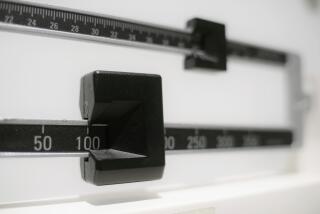Faithful food diary key to weight loss, study says
- Share via
Older women who want to lose weight – or keep off the weight they’ve lost – should faithfully keep a log of everything they eat, avoid restaurants at lunchtime and not skip meals, researchers say in a study out Friday – results that echo the message that awareness is one key to a healthful weight.
The research from the Fred Hutchinson Cancer Research Center in Seattle also found that the women who skipped meals lost almost eight fewer pounds over a year than the women who did not.
This is research anyone can try replicating for themselves: Write down what you eat every day and see whether you lose weight. Avoid restaurant meals, especially lunches, and don’t skip meals; see whether those behaviors help, said Dr. Anne McTiernan, the lead researcher.
A number of commercial weight programs call for keeping a food journal, as do recommendations from many experts. Starting a food diary can make people realize they didn’t really know what they’d been eating.
“Most of the women were very surprised at what they were eating,” McTiernan said in an interview. “When they went through the process of doing their journals and met with a dietitian, they were really surprised at how many extra calories they were taking in.”
Just a muffin purchased for a snack might comprise a third of the calories a woman should consume in a day, she noted.
The study looked at how self-monitoring behaviors affected weight loss for six months (with a goal of losing 10% of their weight) and maintenance for another six months. It included postmenopausal overweight or obese women who were monitored from June 2007 to August 2008. The 123 women, ages 50 to 75, were divided into two groups: just diet and diet and exercise, with the latter group having a goal of 45 minutes of moderate to vigorous exercise five times a week.
Over the course of the study, they met with dietitians, had group meetings, submitted their eating logs and filled out detailed questionnaires. The women, with an average age of 58, lost more in the exercise group than in the diet-only group, but not by much.
Exercise is “critical,” McTiernan says, but more important for maintenance, helping avoid the loss of muscle mass. For losing weight, the calories were key, she said.
The biggest factor in the study was the food journal. Those who turned them in more regularly lost an average of 12.8% of their weight, as opposed to below-average journal-keepers, who lost an average of 8.2%.
The dietitians looked at the women’s food logs, but didn’t score them on the details included, McTiernan says. But, she adds, “An individual person can see for themselves. If they’re making gross estimates, ‘Oh, that’s only 50 calories.’ And over a few weeks they’re not losing weight. … The key is accountability.”
The women in the study were taught to measure portions, calculate serving sizes and ways to estimate what they’re eating when measuring wasn’t possible. For example, a piece of meat the size of a deck of cards is about 4 ounces, she says.
And McTiernan has some thoughts for the gazillions of women who have tried to lose weight – or lost it only to gain it back. And more.
“Most American women have tried to lose weight at some point,” she says. “The answer there is never give up.”
Other major factors were skipping meals and eating in restaurants, especially at lunch. That meals out has a negative effect on weight has been shown previously, but not in this age group of women, the study says. McTiernan says it can be hard in a restaurant to know exactly how much you’re eating.
McTiernan says the women have been followed after the end of the 12 months, but that data has not been analyzed yet.






